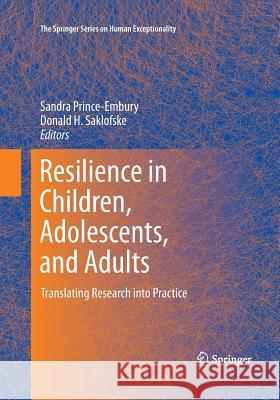Resilience in Children, Adolescents, and Adults: Translating Research Into Practice » książka



Resilience in Children, Adolescents, and Adults: Translating Research Into Practice
ISBN-13: 9781493951680 / Angielski / Miękka / 2016 / 349 str.
Resilience in Children, Adolescents, and Adults: Translating Research Into Practice
ISBN-13: 9781493951680 / Angielski / Miękka / 2016 / 349 str.
(netto: 460,04 VAT: 5%)
Najniższa cena z 30 dni: 462,63
ok. 22 dni roboczych.
Darmowa dostawa!
This book recognizes the growing need to strengthen the links between theory, assessment, interventions, and outcomes to give resilience a stronger empirical base, resulting in more effective interventions and strength-enhancing practice.
From the reviews:
"In the 21 chapters of this volume, the authors clarify the measure of resilience, its relation to mental health, to stress, and influence on adult age behavior. Of interest to child psychologists, educators and researchers in developmental psychology, as well as for mental health personnel." (Pediatric Endocrinology Reviews (PER), Vol. 10 (4), July, 2013)I. Introduction.- 1. Translating Resilience Theory: Introduction; Sandra Prince-Embury, Donald H. Saklofske.- 2. Translating Resilience Theory for Assessment and Application with Children, Adolescents and Adults: Conceptual Issues; Sandra Prince-Embury.- II. Resilience and Children.- 3. Resiliency Scales for Children and Adolescents (RSCA): Theory, Research and Clinical Application; Sandra Prince-Embury.- 4. The Devereux Suite: Assessing and promoting resilience in children 1 month to 14 years; Paul M. LeBuffe, Katherine M. Ross, Jennifer L. Fleming, Jack A. Naglieri.- 5. Classroom and Peer Ecological Resilience: Practical Assessment for Intervention; Samuel Song, Beth Doll, Kelly Marth.- 6. Coaching Parents and Teachers to Develop and Enhance Resilient Mindsets in Children; Sam Goldstein, Robert Brooks, Melissa DeVries.- 7. Mental Health Promotion in the Schools: Supporting Resilience in Children and Youth; Barry Mallin, John R. Walker, Benjamin Levin.- 8. Resilience in Childhood Disorders; Emma A. Climie, Sarah M. Mastoras, Adam W. McCrimmon, Vicki L. Schwean.- III. Resilience, Youth and Adults.- 9. The Ego Resiliency Scale by Block and Kremen (1996) and Trait Ego; Sandra Prince-Embury.- 10. Perceived Self-Efficacy and Its Relationship to Resilience; Ralf Schwarzer, Lisa Marie Warner.- 11. Development and use of the Resilience Scale ™ (RS) with middle and older Adults; Gail Wagnild.- 12. The Connors-Davidson Resilience Scale (CD-RISC); Sandra Prince-Embury.- 13. The Foundations of Resilience: What are the Critical Resources for Back from Stress? Brief Resilience Scale; Bruce W. Smith, Emmerson M. Epstein, J. Alexis Ortiz, Paulette J. Christopher, Erin M. Tooley.- 14. Young adult resiliency assessment: Validity studies of the RSCA-A and RSCA-A-R; Donald H. Saklofske, David W. Nordstokke, Sandra Prince-Embury, Tara Crumpler, Sarah Nugent, Ashley Vesely, Yvonne Hindes.- 15. Exploring Resilience through the Lens of Core Self-Evaluations; Diane C. Elliot, Pamela Kaliski, Jeremy Burrus, Richard D. Roberts.- 16. Resilience Revisited: Toward an Expanding understanding of Post Disaster Adaptation; Raymond F. Hanbury, Monica J. Indart.- 17. Community Level Resilience Intervention in a Post-Disaster Environment: The Three Mile Island Health and Environmental Information Series; Sandra Prince-Embury.- IV. Resilience, Cultural and Systemic Issues.- 18. A Measure of Resilience with Contextual Sensitivity: CRMY-28; Michael Unger, Linda Libenberg.- 19. Resilience in Kenyan Youth living in the Slums and Suburbs of Nairobi; Beverly Tignor, Sandra Prince-Embury.- 20. Cultural Considerations for Building Social-Emotional and Academic Resilience in Hispanic Bilingual Preschool Children; Geraldine V. Oades-Sese, Mark Kitzie, Christopher Velderman, Wai-Ling Rubic, Sarah Rutstein, Miles Waltuck.- 21. A Strengths-based Social Psychological Approach to Resilience: Cultural Diversity, Ecological and Lifespan Issues; Phillip Bowman.- 22. Bowen Systems Theory Applied to Systemic Resilience versus Vulnerability; Sandra Prince-Embury.- 23. Epilogue; Sandra Prince-Embury, Donald H. Saklofske.
Sandra Prince-Embury, Ph.D., is a licensed clinical psychologist and family therapist serving children, adolescents and families for thirty years. In addition to clinical work, Dr. Prince-Embury taught at Pennsylvania State University and engaged in research on community response to technical disaster. Her work with residents of the Three Mile Island community is housed at the Dickenson College Archives in PA. Currently Director of the Resiliency Institute of Allenhurst, LLC, she is engaged in research, writing and consultation associated with her recently authored Resiliency Scales for Children and Adolescents (RSCA).
Donald. H. Saklofske, Ph.D., is a Professor in the Department of Psychology, Western University, Canada. His main research interests include intelligence, personality, and individual differences. He is a Fellow of the Canadian Psychological Association and the Association for Psychological Science.
Resilience in Children, Adolescents, and Adults: Translating Research into Practice recognizes the growing need to strengthen the links between theory, assessment, interventions, and outcomes to give resilience a stronger empirical base, resulting in more effective interventions and strength-enhancing practice. This comprehensive volume clarifies core constructs of resilience and links these definitions to effective assessment. Leading researchers and clinicians examine effective scales, questionnaires, and other evaluative tools as well as instructive studies on cultural considerations in resilience, resilience in the context of disaster, and age-appropriate interventions.
Key coverage addresses diverse approaches and applications in multiple areas across the lifespan. Among the subject areas covered are:
- Perceived self-efficacy and its relationship to resilience.
- Resilience and mental health promotion in the schools.
- Resilience in childhood disorders.
- Critical resources for recovering from stress.
- Diversity, ecological, and lifespan issues in resilience.
- Exploring resilience through the lens of core self-evaluation.
Resilience in Children, Adolescents, and Adults is an important resource for researchers, clinicians and allied professionals, and graduate students in such fields as clinical child, school, and developmental psychology, child and adolescent psychiatry, education, counseling psychology, social work, and pediatrics.
1997-2026 DolnySlask.com Agencja Internetowa
KrainaKsiazek.PL - Księgarnia Internetowa









